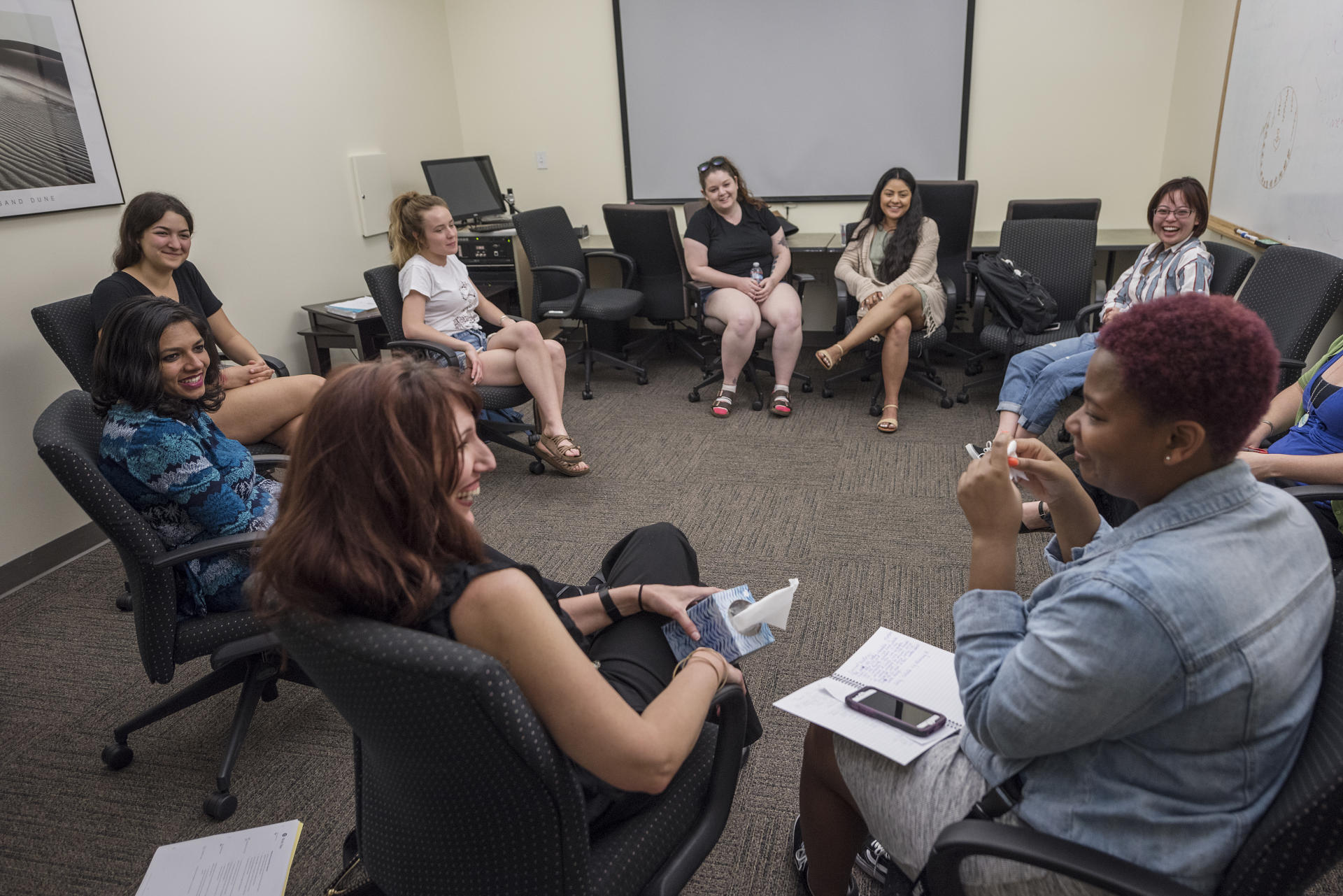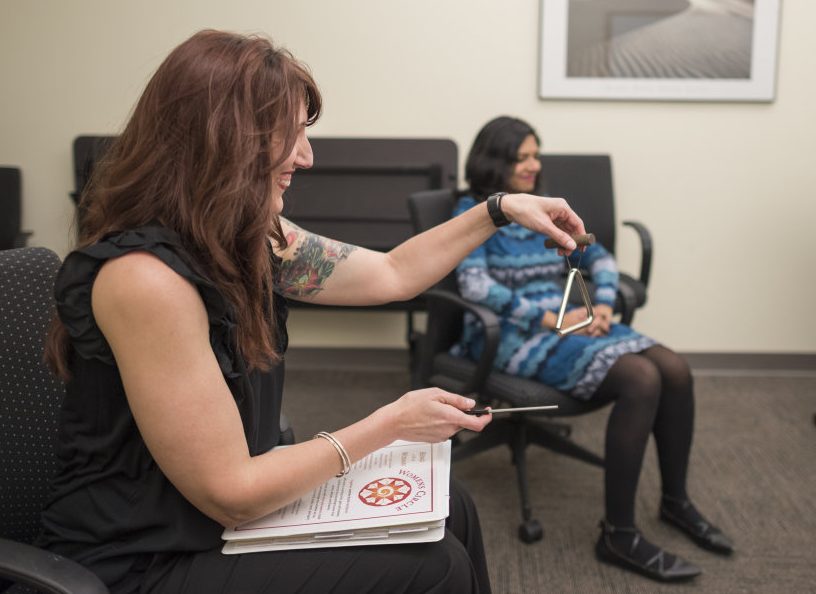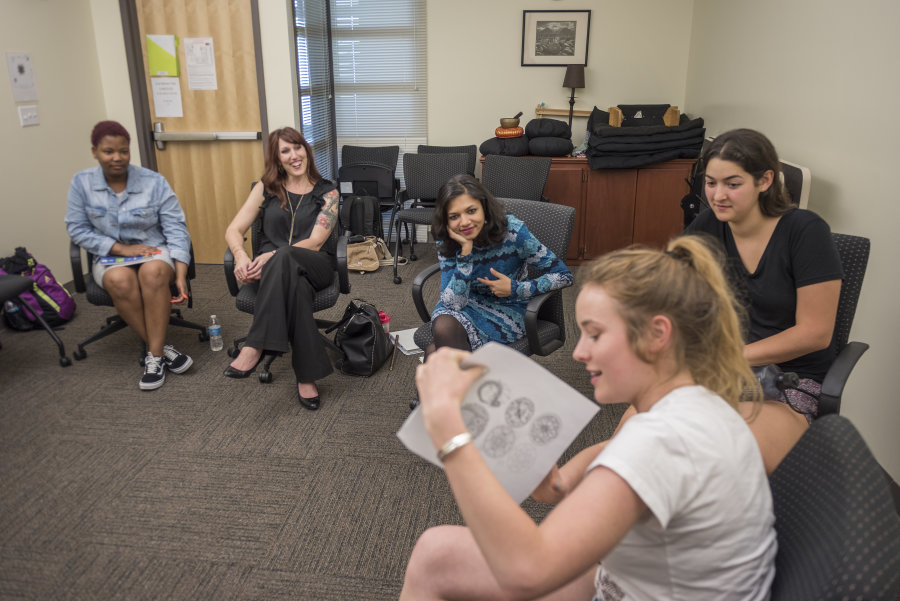Supporting Well Women

Faculty Shelley Hart (left) and Shrija Dirhanji (right) lead a weekly women’s circle for students.
If laughter is the best medicine, the weekly Women’s Circle is fulfilling its mission.
The students who participate aren’t necessarily sick or searching for healing; they are looking to become even better versions of themselves—better students, better leaders, better friends, better women.
“So often, women are the caretakers. Here, we fully focus on ourselves,” said senior Junlu Dai, who is majoring in child development.
Child development faculty members Shrija Dirghangi and Shelley Hart brought the national Being a Well Woman curriculum to Chico State this spring with support from the University’s Counseling and Wellness Center. A project between The Ohio State University and the One Circle Foundation, the Women’s Circle aims to aims to enhance women’s self-esteem and confidence.
Its quiet but successful launch brought a dozen or so female students to a meeting space in the Student Services Center every Tuesday for 10 weeks. They shared, built skills, and encouraged one another to live authentically in mind, body, and heart, while focusing on topics such as interpersonal safety, setting boundaries, establishing goals, addressing conflict, coping with adversity, and much more. As the semester progressed, the women—who started as strangers or classmate acquaintances—began greeting each other like old friends.
“Especially during college, you are at the age where you face so many personal issues,” said and junior Lindsey Phillips, a child development major. “Knowing people to talk about these issues specifically is really important. Just having a space to feel welcome and safe to talk is important.”

Hart started each session by softly ringing a chime as the students sat facing one another in a circle. One by one, they shared thoughts from their week: readiness for the semester to end, how they finally feel organized yet have so much due, how spring weather brings out the best in wardrobes and the worst in body insecurities.
They rallied one another’s confidence, and their own.
“It feels so good to be in this space,” said senior Jessica Rosales, a double major in child development and sociology. “I feel so included. When someone talks, no one else talks. I feel so heard and respected. You can feel empowered with these people.”
After one session where they outlined their goals on a poster, senior Nicole Reynoso went home and hung it on the wall of her bedroom so she can review her aspirations every day.
“It’s just inspiring, always. Those questions are something you should be asking all the time—and watching them change,” the child development major said. “Will they be the same when you are 30? Probably not.”
Many of the students tucked the products of their self-reflection carefully away at the end of each session, sometimes revisiting them the next week. As they talked about how they identify themselves, Rosales pulled a mandala out of her bag and explained the flowering plants she drew under rainy skies.
“There are times when I water my spirit and times I don’t,” she explained, as the women around her nodded in understanding. “It depends how much water I pour on my spirit if it will grow or if I will grow as a person.”
Sophomore Rodaisha James, a business administration major, told the group she’d been thinking about a song that meant a lot to her and pulled out her phone and played “Exhale” by Whitney Houston. As the lyrics tumbled forth, tears began to trickle from her eyes. The room sat quietly, listening, contemplating, as James gathered herself and explained why it resonated so deeply.
“Her words give me comfort. Her words remind me that I don’t have to go to other people for answers. I should be OK with myself. And I am strong,” she said.
That vulnerability—to bare one’s innermost thoughts, to let inner emotion on full display—was not uncommon. Phillips too began to cry as she described her greatest insecurities and her fear that her destiny is to fail, like so many others have before her.

“Sometimes right now, the only thing I know for sure in my life is helping other people not feel the things that I’m feeling,” she said. “Knowing that I’m showing up every day, doing the best I can to help other people is the best I can do.”
“I can feel exactly how you feel right now,” Dai said, compassion and encouragement in her eyes. “It will be worth it. It will be.”
At the end of the session, the students contemplated what they could do to live a more meaningful life. Call their grandparents. Go easier on themselves. Make eye contact with other people.
The women’s circle has been an outlet and a safe space, James said. In a society where counseling may be out of reach—financially, for access reasons, or concerns about stigma and stereotypes—students agreed this weekly group provided a comfortable space to focus on mental health, wellness, and personal growth.
Whether journaling, practicing exercises for relieving stress, or writing a letter to their future selves, it was a time for forced self-reflection and unexpected camaraderie.
“There are so many things that I felt like, ‘Wow. I thought it was just me,’” said sophomore Tia Semmes, who is double majoring in child development and psychology.
The room nodded in agreement.
“We are always comparing ourselves. Sometimes we think no one has the experiences we have—but people can relate,” Hart said. “I think that’s why we are here, and why we keep showing up.”
Dirghangi plans to expand the program in the fall and is looking for additional faculty and staff to be facilitators.
“With #MeToo, it felt timely to give women a voice. This is such a good way to strengthen women as they come together,” she said. “And any woman can do this. We have our own experiences and can support other women.”
No experience is necessary, the curriculum is provided, and a training will be held on campus August 20. Anyone interested can contact her at sdirghangi@csuchico.edu.


